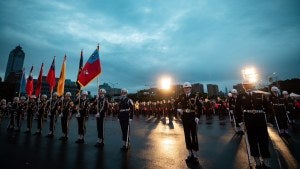Two-Thirds of Americans Think US-Taiwan Relations Bolster US Security

But a majority oppose sending US troops if China were to invade the island.
The 2023 Chicago Council Survey, conducted September 7–18, 2023, finds Americans support most forms of aid to Taiwan if China were to invade the island but are divided over using military force to aid Taiwan’s defense.
Key Findings
- Two-thirds of Americans (65%) say that the US security relationship with Taiwan does more to strengthen than weaken US national security.
- In the event of a Chinese invasion of Taiwan, Americans support airlifting food and medical supplies to Taiwan (78%), imposing economic and diplomatic sanctions on China (75%), and sending additional arms and military supplies to the Taiwanese government (62%).
- Half of Americans (50%) support using the US Navy to break a Chinese blockade around the island, including majorities of Democrats (54%) and Republicans (52%).
- As in past surveys, a majority of Americans (56%) oppose sending US troops to Taiwan to help the Taiwanese government defend itself against China.
Americans see US-Taiwan Relations as Strengthening US National Security
Two-thirds of Americans (65%) say that the US security relationship with Taiwan does more to strengthen than weaken US national security. That includes seven in 10 Democrats (71%), two-thirds of Republicans (65%), and six in 10 Independents (62%).
Bipartisan Support for Aid Short of Deploying US Troops to Taiwan
If China were to invade Taiwan, Americans support aid to Taiwan, as they have in past years. This includes airlifting food and medical supplies to Taiwan (78%), imposing economic and diplomatic sanctions on China (75%), and sending additional arms and military supplies to the Taiwanese government (62%). Additionally, half of Americans (50%) support using the US Navy to break a Chinese blockade around the island (45% oppose). However, Americans remain reluctant to commit US forces to Taiwan itself: a majority of Americans (56%) oppose sending US troops to Taiwan to help the Taiwanese government defend itself against China (39% favor).
Support or opposition to these policies is bipartisan, though Democrats (70%) are somewhat more likely than Republicans (58%) to favor providing Taiwan with arms and military supplies. Additionally, while majorities of Democrats (54%) and Republicans (52%) support using the US Navy to break a Chinese blockade around Taiwan, Independents are divided (47% support, 49% oppose).
Americans’ views of how to aid Taiwan in the event of a Chinese invasion have changed little over the past year. The only notable shift has been a small decline in support for sending additional arms and military supplies to Taiwan, with Republican support declining four points and Independent support declining by five points, perhaps as a consequence of the ongoing debate in the United States about similar aid to Ukraine. It is also worth noting that public support for dealing with a blockade of Taiwan—seen as a likely scenario for a campaign of forced unification—varies depending on how the US response is worded. As the past two years of survey results show, Americans are more likely to support using the US Navy to prevent a blockade around the island than they are using the Navy to break a blockade.
This analysis is based on data from the 2023 Chicago Council Survey of the American public on foreign policy, a project of the Lester Crown Center on US Foreign Policy. The 2023 Chicago Council Survey was conducted September 7-18, 2023 by Ipsos using its large-scale nationwide online research panel, KnowledgePanel, in both English and Spanish among a weighted national sample of 3,242 adults aged 18 or older living in all 50 US states and the District of Columbia. The margin of sampling error for the full sample is ±2.0 percentage points including a design effect of 1.2908. The margin of error is higher for partisan subgroups or for partial-sample items.
Partisan identification is based on how respondents answered a standard partisan self-identification question: “Generally speaking, do you think of yourself as a Republican, a Democrat, an Independent, or what?”
The 2023 Chicago Council Survey is made possible by the generous support of the Crown family, the Korea Foundation, and the United States-Japan Foundation.


Related Content
 US Foreign Policy
US Foreign Policy
A plurality of Americans—and a majority of Republicans—also say that US leaders are not paying enough attention to US-China competition.
 Defense and Security
Defense and Security
Deep Dish explores the challenges and choices Taiwan faces in preserving peace and navigating its delicate relationship with China and the US.
 Defense and Security
Defense and Security
Military conscription is a good start, but leaders in Taipei need to act with greater urgency still, Ethan Kessler writes.



